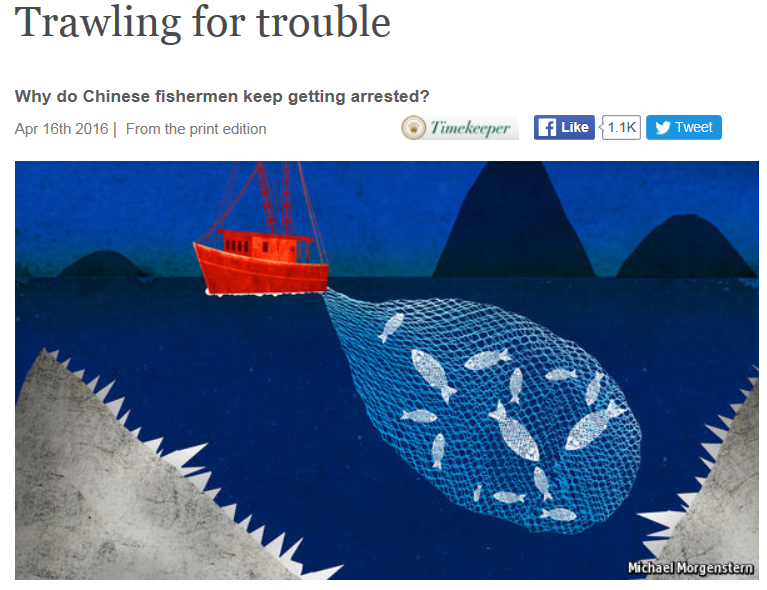
It is no secret that illegal fishing is a substantial problem.
According to FAO, Illegal, Unreported, and Unregulated (IUU) fishing accounts for 15 percent of annual global catch. That’s at least 26 million tonnes lost. And it means that an estimated $10-20 billion is also lost annually from the global economy.
While fishing vessels from many countries engage in illegal fishing practices, China’s practices in particular have garnered a lot of media attention as of late.
A story in The Economist titled ”Trawling for trouble” exposes a growing pattern of illegal fishing infractions by fishers from the rapidly industrializing state.
The government of Indonesia is awaiting a Supreme Court decision that would allow them to destroy ten Chinese vessels caught poaching in Indonesian waters in 2014. While it is accepted by many observers that the vessels were inside Indonesia’s Exclusive Economic Zone (EEZ), the Chinese government maintains the fishers were, instead, inside “traditional Chinese fishing grounds.”
But Chinese fishers have been caught illegally fishing in other countries as well. The governments of Japan, the Philippines, Taiwan and Vietnam have all detained Chinese fishers in their waters (these waters are also contested by China). And Chinese fishers have also been detained in Russia, North and South Korea and Sri Lanka.
Part of the problem is consumption. According to The Economist, “Chinese fish-consumption per person is twice the global average.” To sustain this massive demand, China’s wild catch is equally as large, at around 14 million metric tonnes, compared to the U.S.’s 7 million metric tonnes. As the fish in China’s coastal waters are already greatly overfished, and continue to be depleted (inshore fisheries have 5-30% of the amount of fish they had in the 1950’s), their fleets are actively encouraged to venture further out into the ocean in search of larger catches.
But foreign policy is another reason for China’s aggressive fishing practices. As the article states: “fish can have strategic uses.” Not only does China have the world’s largest distant water fleet, fishing in nearly every country in the world (Pauly et al. 2014), but China also claims sovereignty over much of the South China Sea, and when a vast fleet of boats extensively operates in these waters, each boat seems to create a physical fact for China’s claims. It seems international rules and norms are being manipulated when one country’s EEZ is described by another country as their own “traditional waters.” Thus, China is one of the few state actors that does not seem to be willing to recognise the globally negotiated UNCLOS provisions for defining and addressing EEZ and territorial water claims.
And this is a fact that is hard to ignore. Yet there are many strategies that can help reduce this practice, as long as flag and host countries are willing to accept and operate within international norms and rules agreed to by the global community. From satellite monitoring, to increased vessel identification, to better enforcement, IUU fishing can be faced head-on.
In future posts we will explore more strategies.
Reference:
Pauly D, Belhabib D, Blomeyer R, Cheung WWL, Cisneros-Montemayor A, Copeland D, Harper S, Lam V, Mai Y, Le Manach F, Österblom H, Mok KM, van der Meer L, Sanz A, Shon S, Sumaila UR, Swartz W, Watson R, Zhai Y and Zeller D (2014) China’s distant water fisheries in the 21st century. Fish and Fisheries 15: 474-488.

